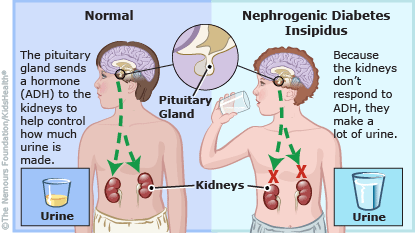In nephrogenic diabetes insipidus, the body loses too much water because of a problem with the kidneys.
More to Know
Normally, the kidneys help balance the amount of water and salt in the body. In nephrogenic diabetes insipidus, the kidneys make more urine (pee) than normal, causing the body to lose more water than it should. This happens because the kidneys don't respond properly to antidiuretic hormone (ADH), also called vasopressin, which helps the kidneys maintain the right water balance.

Someone with the condition might pee often and in large amounts, wet the bed, be thirsty a lot, or get dehydrated. Nephrogenic diabetes insipidus often runs in families, but underlying disorders and certain medications also can cause it. When doctors suspect the diagnosis, they confirm it with the results of blood and urine tests.
Keep in Mind
Medicine and/or a low-salt diet can help the body produce less urine. If diabetes insipidus is caused by an underlying disorder, the doctor might treat that also.
All A to Z dictionary entries are regularly reviewed by KidsHealth medical experts.


